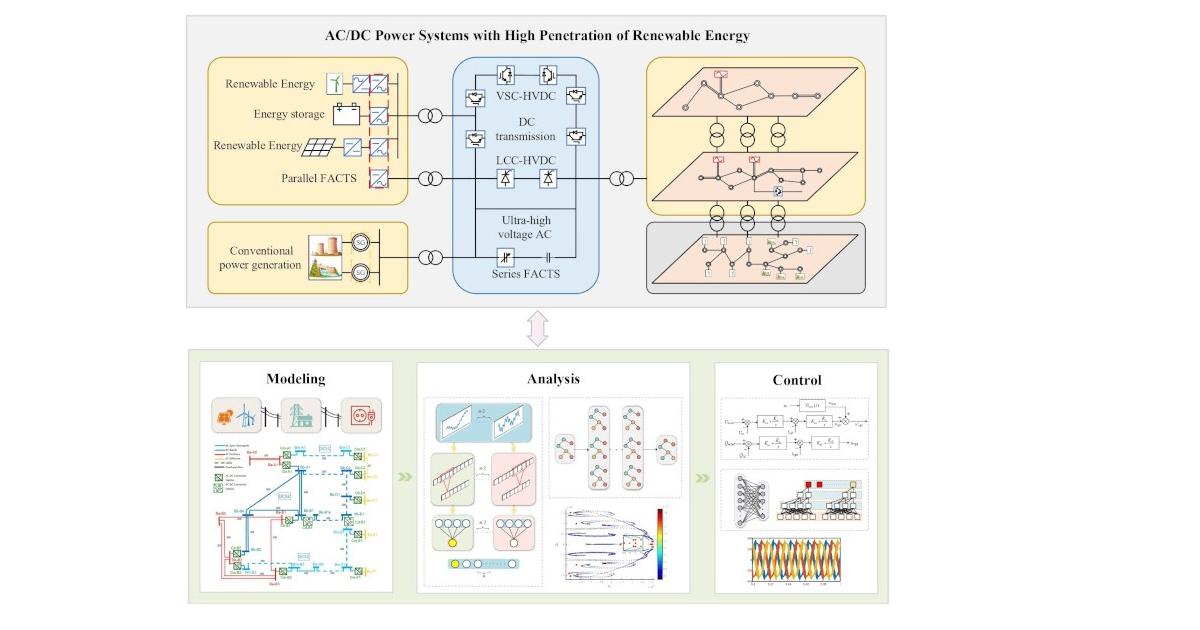Modelling, Analysis and Control of AC/DC Power Systems with High Penetration of Renewable Energy
A special issue of Energies (ISSN 1996-1073). This special issue belongs to the section "F1: Electrical Power System".
Deadline for manuscript submissions: 24 October 2024 | Viewed by 421

Special Issue Editors
Interests: power system stability and control; renewable energy; stability analysis; electromagnetic transient simulation and modelling; digital twin; artificial intelligence
Interests: power system stability and control; artificial intelligence; parameter identification
Interests: power system protection and control; power quality of the DC distribution network; power system stability and control
Special Issues, Collections and Topics in MDPI journals
Special Issue Information
Dear Colleagues,
At present, large-scale renewable energy and HVDC are been integrated into the power system and the penetration of renewable energy has been increasing year by year. As a result, the nonlinear characteristics of renewable energy and HVDC increase the difficulty of performing modelling analysis and controlling AC/DC power systems. Furthermore, the fluctuation, intermittency and vulnerability properties of renewable energy may increase the risk of the instability of AC/DC power systems.
In order to discuss the key technologies and issues related to AC/DC power systems with high penetration of renewable energy in modelling, analysis and control, we invite experts and scholars to submit papers discussing the latest academic and technological achievements. Topics to be covered in this Special Issue include, but are not limited, to the following:
- Modelling of AC/DC power systems;
- Optimal control method for power systems;
- Frequency regulation techniques for power systems;
- Wide-band frequency oscillation analysis for AC/DC power systems;
- Power quality improvement technique for AC/DC power systems.
Dr. Shilin Gao
Dr. Zongsheng Zheng
Dr. Jianquan Liao
Guest Editors
Manuscript Submission Information
Manuscripts should be submitted online at www.mdpi.com by registering and logging in to this website. Once you are registered, click here to go to the submission form. Manuscripts can be submitted until the deadline. All submissions that pass pre-check are peer-reviewed. Accepted papers will be published continuously in the journal (as soon as accepted) and will be listed together on the special issue website. Research articles, review articles as well as short communications are invited. For planned papers, a title and short abstract (about 100 words) can be sent to the Editorial Office for announcement on this website.
Submitted manuscripts should not have been published previously, nor be under consideration for publication elsewhere (except conference proceedings papers). All manuscripts are thoroughly refereed through a single-blind peer-review process. A guide for authors and other relevant information for submission of manuscripts is available on the Instructions for Authors page. Energies is an international peer-reviewed open access semimonthly journal published by MDPI.
Please visit the Instructions for Authors page before submitting a manuscript. The Article Processing Charge (APC) for publication in this open access journal is 2600 CHF (Swiss Francs). Submitted papers should be well formatted and use good English. Authors may use MDPI's English editing service prior to publication or during author revisions.
Keywords
- AC/DC power system
- renewable energy
- stability analysis
- control
- modelling







